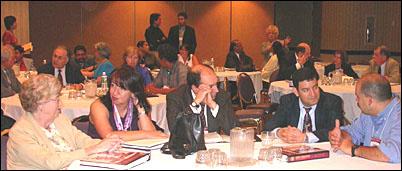
June 22-24, 2003
New ground was broken in June 2003 when Latinos from around the country gathered in Washington, DC to open dialogue, discussion and debate about human genetics issues and their significance to the Hispanic/Latino population.
The first-of-its-kind project, called the Hispanic/Latino Genetics Community Consultation Network (HLGCCN) summit meeting, brought together 75 key opinion leaders and genetics experts from Hispanic/Latino communities across the United States. In addition, participants included 20-25 federal government health officials.
Redes En Acción, the Baylor College of Medicine and research institutions of the National Institutes of Health coordinated the June 22-24 conference. The purpose of the HLGCCN project is to provide a forum for Latinos to identify, prioritize and disseminate information on genetics issues, particularly those that confront the Hispanic/Latino community, noted Amelie G. Ramirez, DrPH, Principal Investigator of the HLGCCN project and Redes En Acción.
"Despite all of the remarkable advances in human genetics research, people are generally unaware of many of the issues in this field that directly impact the public," said Dr. Ramirez. "With this project, we're developing a participatory model for involving Latinos in identifying and discussing these issues and examining those that are of great significance to our Hispanic/Latino population."
In addition to participants who gathered in Washington, DC, a larger number of Latinos around the country took part in identification of priority genetics issues through pre-meeting surveys using the Delphi process. The surveys were administered in collaboration with the University of Maryland.
The HLGCCN project is a combined effort of Redes En Acción and Baylor College of Medicine with the National Institute of General Medical Sciences (NIGMS), National Human Genome Research Institute (NHGRI) and National Cancer Institute (NCI) (specifically, the Specialized Programs of Research Excellence, Cancer Genetics Network and Special Populations Networks).
Leadership of several National Institutes of Health (NIH) supporting institutions participated on panels at the summit meeting. The panel that responded to strategic action and dissemination plans determined by conference participants included Dr. Andrew C. von Eschenbach, NCI Director; Dr. Francis Collins, NHGRI Director; and Dr. Judith Greenberg, NIGMS Acting Director. Dr. Greenberg and Dr. Raynard Kington, Deputy Director of NIH, served on a conference welcoming panel chaired by Dr. Jorge Gomez, Chief, Organ System Branch of NCI
The meeting in Washington, DC was intended to provide much-needed information and feedback for federal policy makers who are addressing human genetics issues involving research, health care, training and public education, said Dr. Ramirez.
"This project is a very significant event," she said. "It will increase the knowledge of the Hispanic/Latino community's research priorities, ethical issues significant to this population, and needs and opportunities for fostering issues as they relate to Latinos.
"In addition, it is extremely important that the number of Latinos participating in clinical genetic research be increased, and this project has tremendous potential to help achieve that."
What Is Redes En Acción? Redes En Acción is a major NCI-supported initiative to combat cancer among Latinos through a nationwide network of community-based organizations, research institutions, government health agencies and the public. Core activities include promoting cancer training and research opportunities for Latino students and researchers, generating research projects on key Latino cancer issues, and supporting cancer awareness activities within the Latino community.
The initiative is coordinated by the Baylor College of Medicine in Houston and San Antonio, with regional network centers in San Antonio, New York, Miami, Chicago, San Francisco and San Diego.



